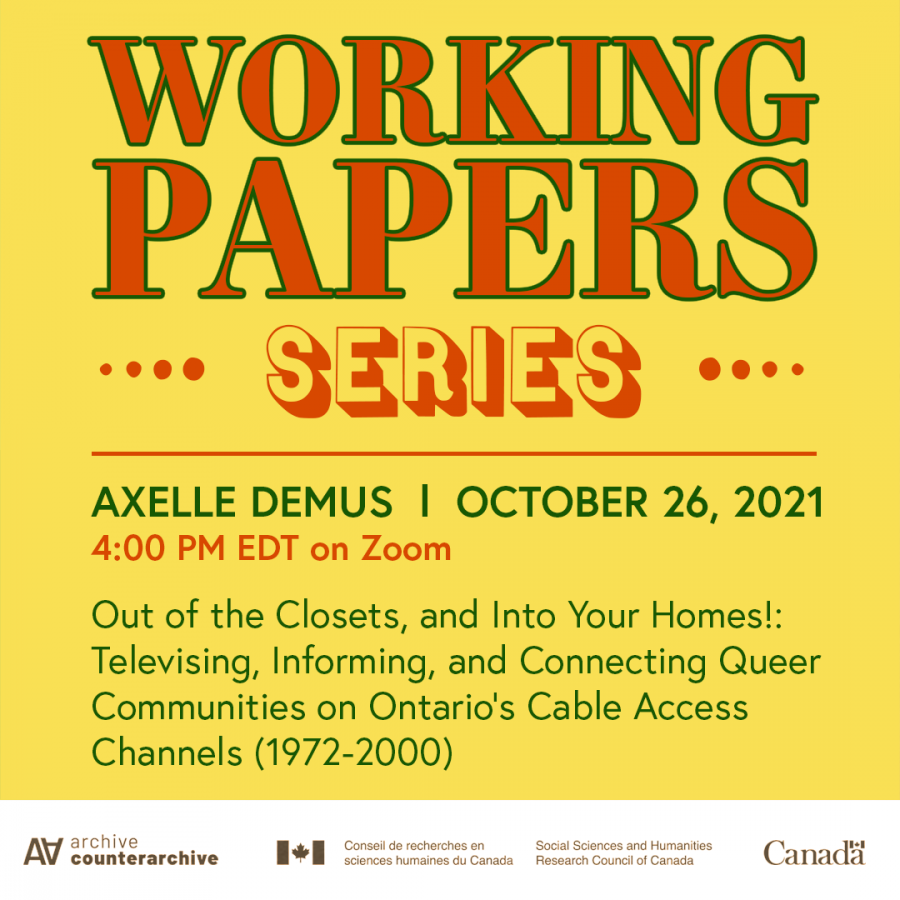Out of the Closets, and Into Your Homes!: Televising, Informing, and Connecting Queer Communities on Ontario’s Cable Access Channels (1972-2000)
The Working Papers Series:
This talk was part of the Archive/Counter-Archive Working Papers Series, which brings together PhD students from different Universities to hear about exciting doctoral research in the area of archival studies. Our first speaker of this term was Axelle Demus, who is a PhD Candidate in the joint Communication and Culture program at York and Ryerson University. Axelle’s talk was followed by a Q&A with the audience, moderated by our student organizers, Emily Barton and Elisa Arca Jarque.
Around the same time that the LGBTQ2+ movement was becoming visible, public access television emerged in the early 1970s in the aftermath of social and technological changes. In Canada, public access—also known as “cable access”— took the form of mandatory commitment on the part of cable companies to provide equipment, training, and transmission for “citizen-produced programming.” Cable access was subsequently harnessed by queer communities across Canada as a local platform through the collective, affective, and volunteer labour of community members, activists, and artists. LGBTQ2+ programs reflected the changes experienced by queer communities at the time, and mirrored the particularities of the fragmented landscape of Canadian queer activism. While public access programs existed in most Canadian provinces, Ontario became a locus of cable activities, with Toronto functioning as a hub for queer activists and artists who took to the medium. Other Ontarian cities also experimented with cable access, such as Ottawa and Thunder Bay, and covered issues of importance to their local communities.
Axelle Demus’s talk will provide an overview of their dissertation project, which mobilizes the archives of public access television programs in Ontario and asks: how did public access intersect with and situate itself within the wider constellation of queer community media as well as social and activist networks in Ontario? At the same time, how did public access consolidate and imagine queer networks? How can we mobilize public access’s archives to achieve intergenerational understandings of LGBTQ2+ media history in the province? How does the remediation of and access to queer audiovisual objects reactivate or reimagine queer networks? Deploying and drawing from the concepts of “information activism” (McKinney) and “communicative activism” (Renzi), Axelle Demus’s research proposes that the act of producing and distributing public access TV can be articulated as part of a continuum of queer social, cultural, and political practices which took place in the province from the 1970s to the 2000s. These practices, Demus argues, were guided by “desires for access”: desires for access to media and information, desires to access, build, and sustain local communities, as well as desires for rights and shared histories.
Axelle Demus is a PhD candidate in the joint Communication and Culture program at York and Ryerson University. They hold an MA in Anglophone studies from the Université de Nantes, France, during which they studied the history of HIV/AIDS activist media production and circulation in North America. Their PhD dissertation explores the history of queer cable access television in Ontario, Canada, from the 1970s to the early 2000s and its intersections with the wider constellation of queer community media as well as social and activist networks in the province.


